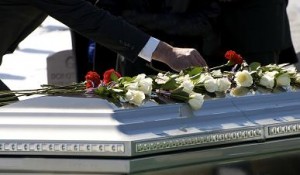When a loved one dies, the family and friends of the deceased are left planning a funeral service in a time of grief and confusion. This article is here to help, and guide you through the steps needed during this difficult time.
 Who To Notify After a Death:
Who To Notify After a Death:
Family Members – Spouse, parents, siblings, children, aunts, uncles, cousins and friends should be notified first. *tip* It might be easiest to appoint certain people to do the calling to help lessen the load.
Insurance Companies – auto, home and life insurance companies, as well as any others the deceased might be associated with.
Employers – If your loved one was working, you’ll need to call his or her employer immediately. You will also want to ask about:
- Deceased benefits and any pay due, including: vacation, sick time, disability income, etc.
- If you or other dependents are still eligible for benefit coverage through the company.
- Whether there is a life insurance policy through the employer, who the beneficiary is and how to file a claim.
Look through the deceased paperwork for the life policy. Call the agent or the company, and ask how to file a claim. Usually the beneficiary (or the beneficiary’s guardian, if a minor) must complete the claim forms and related paperwork.
- Attorney (Estate or other)
- Landlord/Mortgage Company
- Church
- Banks
- Schools
- Retirement Funds
- Credit Card Companies
- Department Of Motor Vehicles (Contact your State DMV)
- Military or Veteran’s Administration 1-800 827-1000
- Social Security 1-800-772-1213
When it is time to coordinate the funeral service, you will need to decide which funeral home to use. Once decided, you can rest assured that the funeral home will help you in many ways, when it comes to planning the service.
Funeral Directors work with the family of the deceased, preparing the logistics of the funeral. They will make the arrangements for transportation, all the necessary paper work and carry out all the choices that the family has made on the deceased service. The services that funeral homes offer differ from state to state, but most will offer the same basic services which include, but are not limited to:
- Providing facilities for the memorial service or funeral
- Placing the obituary in the newspaper
- Assisting the family with ordering floral tributes
- Providing transportation of flowers to grave site or memorial
- Arranging staff and vehicles for graveside services
- Making arrangements for the transferal of the remains for funeral and burial services
- Providing and completing paperwork for burial or cremation
The Funeral Home may request information and documentation for the deceased. This might include:
- Full Name and Date of Birth of the deceased
- Social Security Number
- Name of immediate family members
- Marital status
- Date and place of birth
- Date and Place of death
- Address and phone number
- Mother and Father’s names
- Education Level
- Occupation
Other Things to Consider:
Organ and Tissue Donations: Many people express their interest in being an organ or tissue donor. Often times it will be listed on their driver’s license or Will.
Organ Donating is a time sensitive process, which means that the family will have to make sure that the tissue and/or organ donation wishes are fulfilled in a timely matter.
Grief Counseling: After the death of a loved one, life can seem uncertain and hopeless. Mourning a loved one is painful and personal experience. It is a natural process that one will go through. Most Funeral Homes offer a Grief Counseling both for adults and children. Ask your Funeral Director for more information.
Tags: Death Notification, Funeral Pre-Planning, Post-Death Procedures
[…] an unexpected death occurs, the family and loved ones are caught off guard. Not knowing what to do or where to turn can fuel the fire of grief and confusion. We have accumulated critical […]
[…] available at several funeral homes, making sure the funeral home you chose is suitable for your personal needs and […]